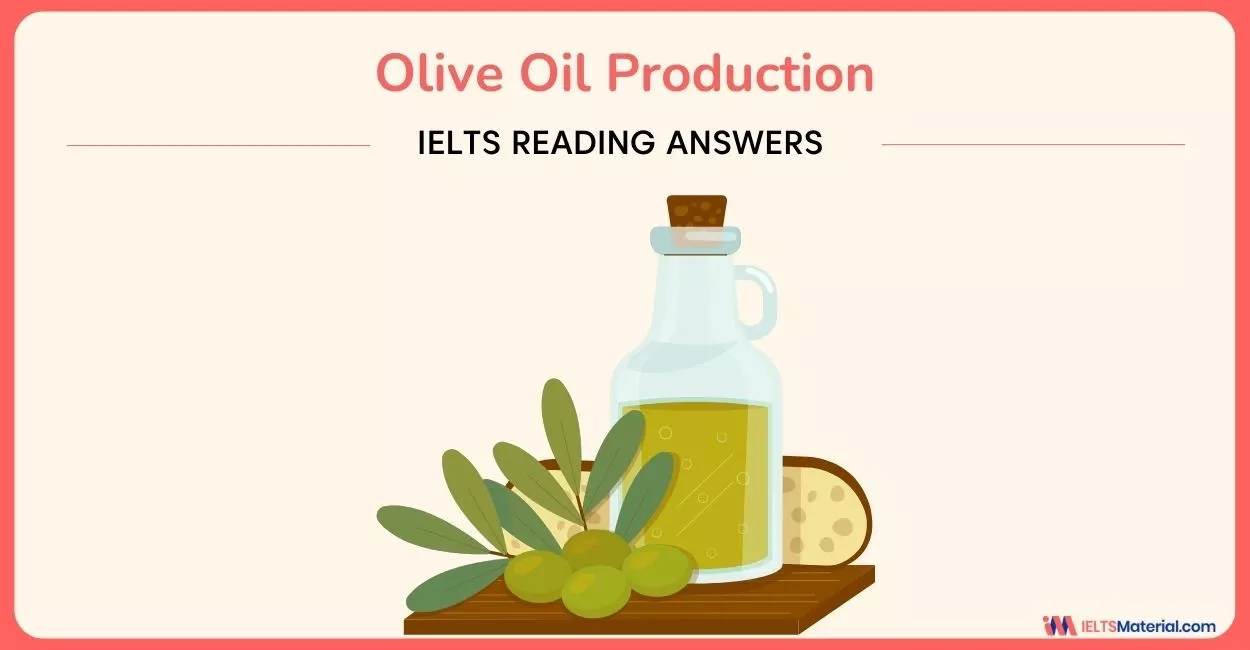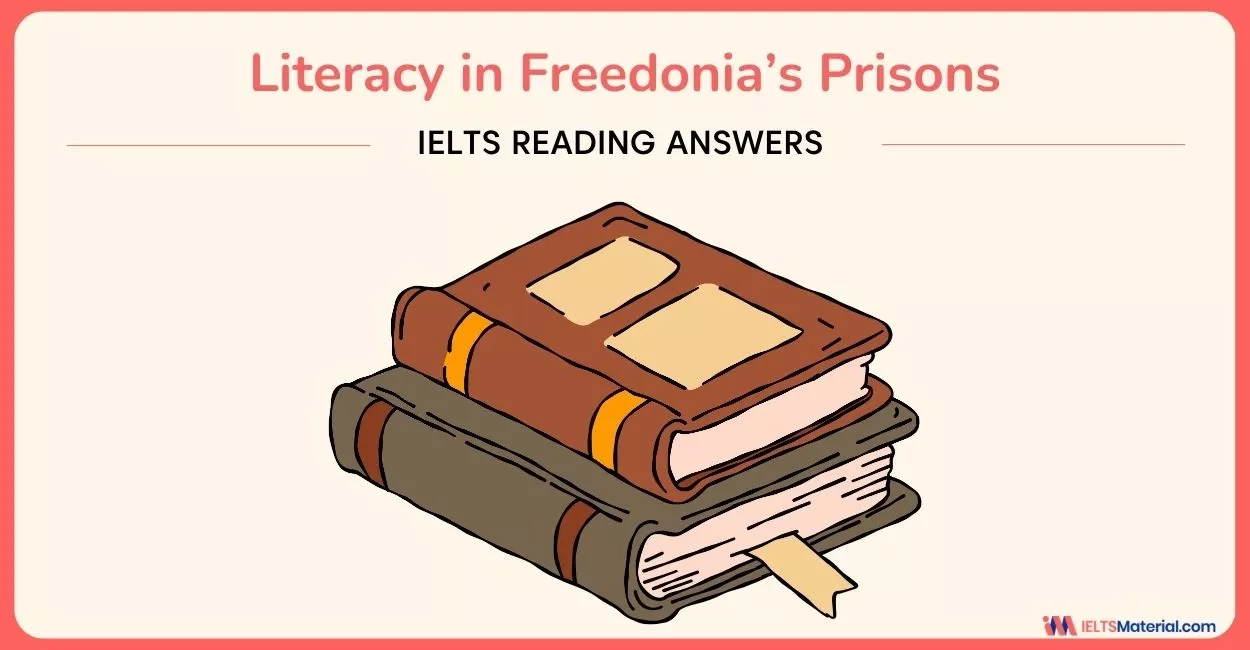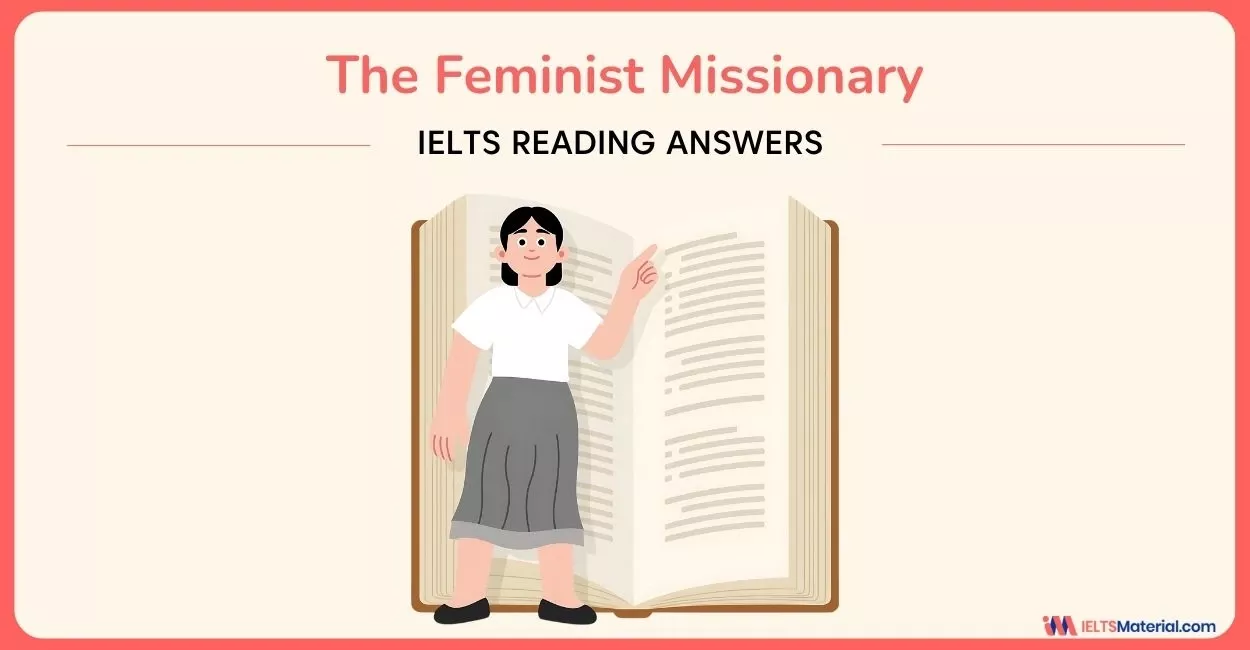The Feminist Missionary - IELTS Reading Answers
10 min read
Updated On
-
Copy link
Improve your IELTS reading score to a band 8+ using 'The Feminist Missionary' IELTS reading passage & its answer key. Discover how to solve two types of IELTS reading questions to significantly improve your comprehension skills and achieve a higher score.
Table of Contents

Limited-Time Offer : Access a FREE 10-Day IELTS Study Plan!
IELTS Reading questions frequently contain distractors - options that seem correct but slightly alter the intended meaning. Practicing with individual passages, such as ‘The Feminist Missionary’, can help you analyze these traps effectively. With concentrated practice, you can learn to identify misleading language and choose answers that accurately align with the passage.
Take the passage 'The Feminist Missionary' below, and try additional IELTS reading practice tests. We have provided explanations for the answers to help you tackle the two different types of reading questions presented here.
Passage for The Feminist Missionary IELTS Reading Answers
Go through the IELTS Academic Reading passage for The Feminist Missionary Reading Answers given below, and be prepared to solve similar topics for the reading section.
You should spend about 20 minutes on Questions 1-13, which are based on the Reading Passage below.
The Feminist Missionary
Western feminism, exported to India and many other third-world countries in recentdecades, has brought with it serious problems. It's not that we don't know what to do with it, that women's significance and dignity are alien to us. In fact, we Indians havea much longer history of individual women's assertiveness than the West, and awell-established tradition of making space for women whose aspirations draw thembeyond stereotypical paths.
Rather, the problem is that feminism has acted as a tool of cultural imperialism. In its Indian form, it has clouded issues and advocated harmful tactics rather than served as a liberating force.
Many ideologies emanating from the West adopt a proselytizing role. Their underlying assumption is that all those who refuse to be converted are steeped in ignorance or stupidity. Western feminists display missionary zeal-they're eager to save souls and tend to look down upon, be hostile to, or at least pity those not already converted.
For instance, most feminists - Western and Indian alike - react with hostility to my refusal to be labelled as such. It took me a long time to understand the reason: Anyone refusing to be counted as a convert seems to be challenging feminism's own tenet that it has universal applicability, that it's a superior state of being, and that only feminists stand up for the rights of women.
I personally find the term an avoidable burden. It means nothing to most Indians. Neither feminism's history nor its symbolism evokes any response whatsoever among the majority of Indian women.
As products of a more homogenized culture, most Western feminists assume a woman's aspirations the world over must be quite similar. Yet a person's idea of a good life and her aspirations are closely related to what is valued in her particular society. This applies to feminism itself. An offshoot of individualism and liberalism, it posits that each individual is responsible primarily to herself.
At the same time, most feminists view the state as a vital agency for the protection of their individual rights. This view has served to atomize Western societies, often leaving people with only the authority and support of the state (and not even their family) for protection of their rights when they are violated by others.
In societies like India, most of us find it difficult to tune in to this extreme individualism. For instance, most Indian women are unwilling to assert rights in a way that estranges them not just from their family but also from their larger community. They want to ensure their rights are respected and acknowledged by their family and prefer to avoid asserting their rights in a way that isolates them. This isn't slavery to social opinion. Rather, many of us believe life is a poor thing if our own dear ones don't honour and celebrate our rights, if our freedom cuts us off from others. In our culture, both men and women are taught to value the interests of our families more than our self-interest. (Most feminists consider this worldview a product of low self-esteem.)
Cultural issues aside, my most fundamental reservation regarding feminism is that it has strengthened the tendency among India's Western-educated elites to adopt the statist authoritarian route to social reform. The characteristic feminist response to most social issues affecting women - in the workplace, in the media, in the home - is to demand more and more stringent laws. The results in most cases do not better women's lives but rather facilitate a whole spate of vicious and harmful legislation, which has put even more arbitrary powers in the hands of the police and government powers that are routinely abused.
Most of the feminists' energies are spent appealing to governments to enforce the social reforms they've proposed. But dearly held and deeply cherished cultural norms cannot be changed simply by applying the instruments of state repression through legal punishment. Social reform is too complex and important a matter to be left to the police and courts. The best of laws will tend to fail if social opinion is contrary to them. Therefore, the statist route of using laws as a substitute for creating a new social consensus about women's rights tends to be counterproductive.
The final problem with Third-World feminism is that its aspirations are largely directed Westward. Most feminist organizations in India and in other developing countries are dependent on Western funding agencies and accountable primarily to them rather than to the society they claim to serve. Their priorities and agendas are prone to change from year to year, depending on the availability of funds. The moment the United Nations declares the year of the girl child, everyone gets busy planning seminars, writing, researching, and making films on the girl child. If the next year is declared the year of the media, the girl child is forgotten, and the focus shifts to media representation of women.
It is the same in the academic world. From structuralism to deconstructionism to post-modernism, the compass needle keeps swinging, depending on what brings in easy grants, jobs, and recognition. This occurs even as it leads feminists towards such an esoteric vocabulary that regular women don't comprehend a word of it. It also leads feminists toward irrelevance.
Questions for The Feminist Missionary IELTS Reading Answers
The passage, The Feminist Missionary Reading Answers, consists of 13 questions, which showcase two different IELTS Reading question types. They are:
- IELTS Reading Yes, No, Not Given (Q. 1-5)
- IELTS Reading Summary Completion (Q. 6-13)
Questions 1-5
Do the following statements reflect the claims of the writer in the reading passage?
YES if the statement agrees with the writer
NO if the statement contradicts the writer
NOT GIVEN if it is impossible to say what the writer thinks about this
1 Madhu Kishwar prefers not to call herself a feminist.
2 Effective laws made and implemented by women would lead to a great improvement in Indian women's lives.
3 Improvements to women's lives can best be effected through traditional channels.
4 The UN should stop changing the focus of its 'years'.
5 Indian women never dare to insist on their rights because of their low self-esteem.
Questions 6-13
Complete the summary of the reading passage below.
Choose your answers from the box below.
NB: There are more words/phrases than you will need to fill the gaps.
You may use a word or phrase more than once if you wish.
Madhu Kishwar describes three main problems associated with the introduction of Western feminism to Third World countries such as India.
The first is that it becomes a form of 6……, assuming that ideals of individualism and liberalism form the 7…… grounding for women's aspirations. Secondly, she claims that Western feminism encourages dependence on the state for the 8……of individual rights. She sees a dependence on legal channels as likely to give 9…… powers to the police and to government officials.
The third problem is that because feminist organisations in developing countries depend on Western 10……, their focus moves to match the aims of these funding agencies, 11…… on the needs and aspirations of women in their own 12…… She suggests placing greater reliance on a 13……which is firmly grounded in the culture of the community concerned.
|
funding agencies |
protection |
independence |
universal |
besides |
|
rather than |
appropriate |
particularly |
social consensus |
organisations |
|
excessive |
cultural imperialism |
moreover |
society |
feminists |
The Feminist Missionary IELTS Reading Answers with Location and Explanation
Refer to the answer key for 'The Feminist Missionary' with explanations, and evaluate your progress in the IELTS reading module toward achieving a high reading band score.
| Question number | Answer | Explanation |
|---|---|---|
| 1 | TRUE | Paragraph 3 mentions that “most feminists – Western and Indian alike – react with hostility to my refusal to be labelled as such.” The term’ refusal to label as such’ implies that both Western and Indian feminists refuse to be called feminists. Since Madhu Kishwar is an Indian woman’s name, we can infer that her stance is the same as above. As the statement agrees with the information, the correct answer is ‘TRUE.’ |
| 2 | FALSE | There’s a line in paragraph 10 states that “the best of laws will tend to fail if social opinion is contrary to them. Therefore, the statist route of using laws as a substitute for creating a new social consensus about women’s rights tends to be counter-productive.” From this line, we can infer that even if the law changes, it will fail because people’s opinions are contrary to feminists. So, even if laws are made or implemented by women, it won’t lead to any improvement. As the statement contradicts the information, the correct answer is ‘FALSE.’ |
| 3 | NOT GIVEN | A line in paragraph 11 states that “the moment the United Nations declares the year of the girl child, everyone gets busy planning seminars, writing, researching and making films on the girl child.” However, whether these channels do or do not lead to improvement in the lives of women is not mentioned. Hence, the correct answer is ‘NOT GIVEN.’ |
| 4 | NOT GIVEN | Paragraph 11 provides the information that “the moment the United Nations declares the year of the girl child, everyone gets busy planning seminars, writing, researching and making films on the girl child. If the next year gets declared the year of the media, the girl is forgotten.” However, the author nowhere infers that the UN should stop changing its ‘years’ focus. Hence, the correct answer is ‘NOT GIVEN.’ |
| 5 | FALSE | As per paragraph 7, “most Indian women are unwilling to assert rights in a way that estranges them not just from their family but also from their larger community.” This line implies that Indian women do not insist on their rights as it affects their relationships with family and society, not because of their low self-esteem. As the statement contradicts the information, the correct answer is ‘FALSE.’ |
| 6 | Cultural imperialism | The initial line paragraph 2 conveys that “the problem is that feminism has acted as a tool of cultural imperialism.” One of the problems associated with feminism is that it has become a form of cultural imperialism. Hence, the correct answer is ‘cultural imperialism.’ |
| 7 | universal | Paragraph 5 discusses the problem in detail, where it mentions that “As products of a more homogenized culture, most Western feminists assume a woman’s aspirations the world over must be quite similar.” From this line, we infer that western feminists assume that ideals of individualism and liberalism form a universal grounding for women’s emotions. Hence, the correct answer is ‘universal.’ |
| 8 | protection | Paragraph 6 claims that “most feminists view the state as a vital agency for the protection of their individual rights.” Therefore, we can deduce that western feminists encourage dependence on the state to protect individual rights. Hence, the correct answer is ‘protection.’ |
| 9 | excessive | The last line of paragraph 9 contributes more information in this discussion, where a line states that “rather facilitate a whole spate of vicious and harmful legislation which has put even more arbitrary powers in the hands of the police and government-powers that are routinely abused.” The term ‘put even more arbitrary power in hands of police’ suggests that Madhu Kishwar sees dependence on legal channels. It is likely to give excessive power to police and government officials. Hence, the correct answer is ‘protection.’ |
| 10 | Funding agencies | In paragraph 11 the author claims that “most feminists organisations in India and in other developing countries are dependent on Western funding agencies.” This line confirms that developing countries depend on Western funding agencies. Hence, the correct answer is funding agencies.’ |
| 11 | Rather than | In paragraph 11, there’s a line that conveys that “accounting primarily to them rather than to the society they claim to serve.” It signifies that the main focus is primarily to match the motives of these agencies’ rather than aiming at aspiring women. Hence, the correct answer is ‘rather than.’ |
| 12 | society | Paragraph 11, also states “accounting primarily to them rather than to the society they claim to serve.” It also implies that the main focus should be their own society. Hence, the correct answer is ‘society.’ |
| 13 | Social consensus | The last line of paragraph 10 indicates that “social reforms is too complex and important a matter to be left to the police and court. The best of laws will tend to fail if social opinion is contrary to them. The statist route of using laws as a substitute for creating a new social consensus about women’s rights tends to be counter-productive.” As we can infer from the line above, ‘the best of laws will fail if social opinion is contrary to them.’ Therefore, the author is relying on social consensus. Hence, the correct answer is ‘social consensus.’ |
In conclusion, the reading section in IELTS requires not only strong comprehension skills but also the ability to navigate language, limited time, and different types of questions effectively. Therefore, it is recommended to practice IELTS Reading topics for General and Academic, such as ‘The Feminist Missionary IELTS Reading Answers’. This practice will help you build confidence and improve the reading precision necessary for achieving a high score on the IELTS exam.
Useful Links:
- Classifying Societies IELTS Reading Answers
- Speech Dysfluency And Popular Fillers - IELTS Reading Answers
- The Romantic Poets - IELTS Reading Answers
- Storytelling IELTS Reading Answers
- (Esperanto) One Who Hopes - IELTS Reading Answers
- The Sweet Scent of Success – IELTS Reading Answers
- Useful IELTS Reading Articles, Website Resources and Material for Academic and General Training
- IELTS Reading Tips and Techniques to Increase your Reading Speed
Practice IELTS Reading based on question types

Start Preparing for IELTS: Get Your 10-Day Study Plan Today!
Explore other Reading Actual Tests

Kasturika Samanta

Prity Mallick

Kasturika Samanta

Kasturika Samanta
Recent Articles

Nehasri Ravishenbagam

Haniya Yashfeen

Haniya Yashfeen

Haniya Yashfeen




Post your Comments